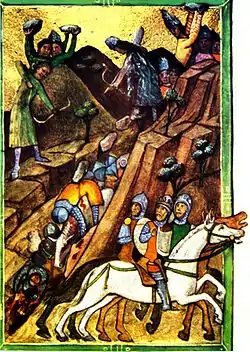1330
Year 1330 (MCCCXXX) was a common year starting on Monday (link will display the full calendar) of the Julian calendar.
| Millennium: | 2nd millennium |
|---|---|
| Centuries: | |
| Decades: | |
| Years: |
| 1330 by topic |
|---|
| Leaders |
|
| Birth and death categories |
| Births – Deaths |
| Establishments and disestablishments categories |
| Establishments – Disestablishments |
| Art and literature |
| 1330 in poetry |
| Gregorian calendar | 1330 MCCCXXX |
| Ab urbe condita | 2083 |
| Armenian calendar | 779 ԹՎ ՉՀԹ |
| Assyrian calendar | 6080 |
| Balinese saka calendar | 1251–1252 |
| Bengali calendar | 737 |
| Berber calendar | 2280 |
| English Regnal year | 3 Edw. 3 – 4 Edw. 3 |
| Buddhist calendar | 1874 |
| Burmese calendar | 692 |
| Byzantine calendar | 6838–6839 |
| Chinese calendar | 己巳年 (Earth Snake) 4026 or 3966 — to — 庚午年 (Metal Horse) 4027 or 3967 |
| Coptic calendar | 1046–1047 |
| Discordian calendar | 2496 |
| Ethiopian calendar | 1322–1323 |
| Hebrew calendar | 5090–5091 |
| Hindu calendars | |
| - Vikram Samvat | 1386–1387 |
| - Shaka Samvat | 1251–1252 |
| - Kali Yuga | 4430–4431 |
| Holocene calendar | 11330 |
| Igbo calendar | 330–331 |
| Iranian calendar | 708–709 |
| Islamic calendar | 730–731 |
| Japanese calendar | Gentoku 2 (元徳2年) |
| Javanese calendar | 1242–1243 |
| Julian calendar | 1330 MCCCXXX |
| Korean calendar | 3663 |
| Minguo calendar | 582 before ROC 民前582年 |
| Nanakshahi calendar | −138 |
| Thai solar calendar | 1872–1873 |
| Tibetan calendar | 阴土蛇年 (female Earth-Snake) 1456 or 1075 or 303 — to — 阳金马年 (male Iron-Horse) 1457 or 1076 or 304 |
Events
January–December
- July 28 – Battle of Velbazhd: The Bulgarians under Tsar Michael Shishman (who is mortally wounded) are beaten by the Serbs. Bulgaria does not lose any territory to Serbia, but is powerless to stop the Serbian advance towards the predominantly Bulgarian-populated Macedonia.
- October 19 – King Edward III of England starts his personal reign, arresting his regent Roger Mortimer, and having him executed.
- November 9–12 – Battle of Posada: The Wallachians, under Basarab I, defeat the Hungarians, though heavily outnumbered, thus making a firm statement towards the independence of Wallachia.
- December 6 – The British Isles are hit by a great storm, creating large areas of sand dunes on Anglesey.
- Undated – Vilnius, Lithuania receives its coat-of-arms, granted to the city in the seventh year of its existence.
- Undated – Ivan Alexander becomes the despot of Lovech.
Births
- June 15 – Edward, the Black Prince, son of Edward III of England (d. 1376)[1]
- July 4 – Ashikaga Yoshiakira, Japanese shōgun (d. 1367)
- October 25 – Louis II of Flanders (d. 1384)
- date unknown
Deaths
- January 13 – Duke Frederick I of Austria (b. 1286)
- January 21 – Joan II, Countess of Burgundy, queen dowager of France (b. 1291)
- March 19 – Edmund of Woodstock, 1st Earl of Kent, son of Edward I and brother of Edward II (executed by Roger Mortimer) (b. 1301)
- May 3 – Alexios II Megas Komnenos, Emperor of Trebizond (b. 1282)
- c. July 31 – Tsar Michael Shishman of Bulgaria (b. 1280s?)
- August 25 – Sir James Douglas, Scottish guerilla leader during the Wars of Scottish Independence (b. 1286)
- September 28 – Elizabeth of Bohemia, queen consort of Bohemia (b. 1292)
- November 29 – Roger Mortimer, 1st Earl of March, de facto ruler of England (b. 1287)
- date unknown

The Battle of Posada (November 9–12, 1330) in Chronicon Pictum. The Basarab I of Wallachia's army ambushes Charles Robert of Anjou, king of Hungary and his 30,000-strong invading army. The Vlach (Romanian) warriors roll down rocks over the cliff edges in a place where the Hungarian mounted knights cannot escape from them nor climb the heights to dislodge the attackers.
References
- "Edward, the Black Prince (1330 - 1376)". bbc.co.uk. Retrieved January 3, 2017.
- Manzano Rodríguez, Miguel Angel (1992). La intervención de los Benimerines en la Península Ibérica (in Spanish). Editorial CSIC - CSIC Press. p. 351. ISBN 978-84-00-07220-9.
This article is issued from Wikipedia. The text is licensed under Creative Commons - Attribution - Sharealike. Additional terms may apply for the media files.